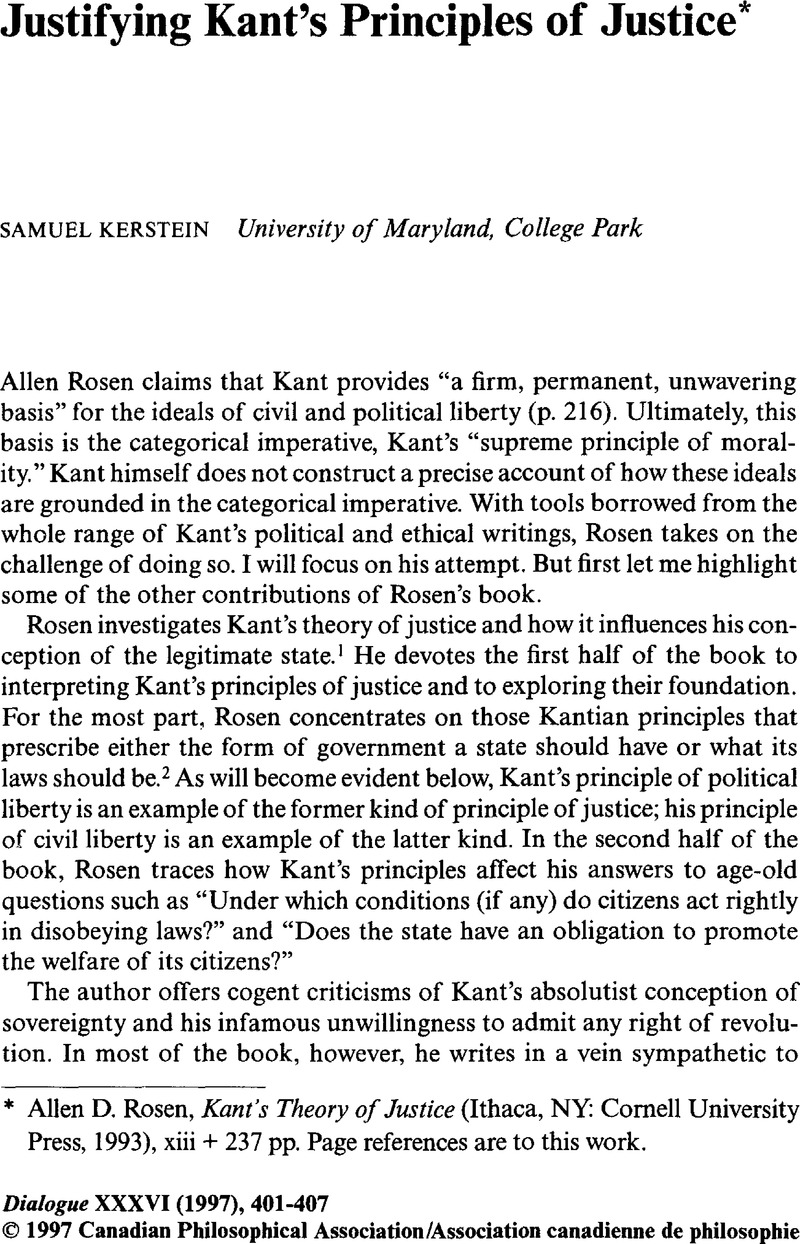No CrossRef data available.
Published online by Cambridge University Press: 13 April 2010

1 Rosen uses the term “justice” to translate Kant's Recht.
2 Note that Rosen's aim is not to offer a comprehensive account of Kant's political philosophy. He does not, for example, discuss Kant's views on penal justice and international law. Rosen also has little to say about Kant's views on “private right” in the Metaphysics of Morals.
3 Kant, Immanuel, Metaphysics of Morals, translated by Gregor, Mary (Cambridge: Cambridge University Press, 1991), p. 56Google Scholar. Like Gregor, Rosen translates Willkür as choice.
4 A third principle, which I will not discuss here, is that of legal equality. As Rosen points out, this principle basically demands that legally sanctioned class privileges be abolished (pp. 26–33).
5 As Rosen notes (p. 18), another aspect of Kant's principle of civil freedom is the notion that nothing an individual may do to herself counts as an injustice to herself. Rosen offers a good reason for rejecting this notion (pp. 21–26).
6 Kant, Metaphysics of Morals, p. 135. With reason, Rosen criticizes Kant's explicit attempt at justifying the illegality of prostitution (pp. 21–22).
7 In Chapter 1, “The Limits of Freedom,” Rosen suggests that he will give some content to the idea of rational consent in Chapters 4 and 5. But I find no passage in which he does so explicitly. Chapter 4 contains some discussion of Kant's views on the relations between the justice of a law and the consent of the people. He sets out Kant's idea that if a whole people could not possibly agree to a law, or if it would be self-contradictory for them to consent to it, then the law is unjust (p. 131). Perhaps Rosen wants to suggest that, for Kant, one cannot rationally consent to something if all one's fellow citizens could not possibly consent to a law specifying it to be permissible under certain conditions. But it seems implausible to claim that all citizens of a particular state could not possibly consent to a law specifying prostitution to be permissible under certain conditions.
8 As Rosen explains, Kant is not a proponent of pure democracy. He envisages it as a form of government where all political questions—including judicial and executive ones—are settled by a majority, without constitutional constraints. Kant sees pure democracy as a kind of mob rule (p. 34).
9 Rosen devotes Chapter 2, “The Justification of Freedom,” to carrying out this task.
10 See, for example, Kant, Immanuel, Grounding for the Metaphysics of Morals, translated by Ellington, James W. (Indianapolis, IN: Hackett, 1993), pp. 33,48.Google Scholar
11 See, for example, Kant, Metaphysics of Morals, p. 44.
12 Kant, Grounding for the Metaphysics of Morals, p. 30.
13 Ibid., p. 36.